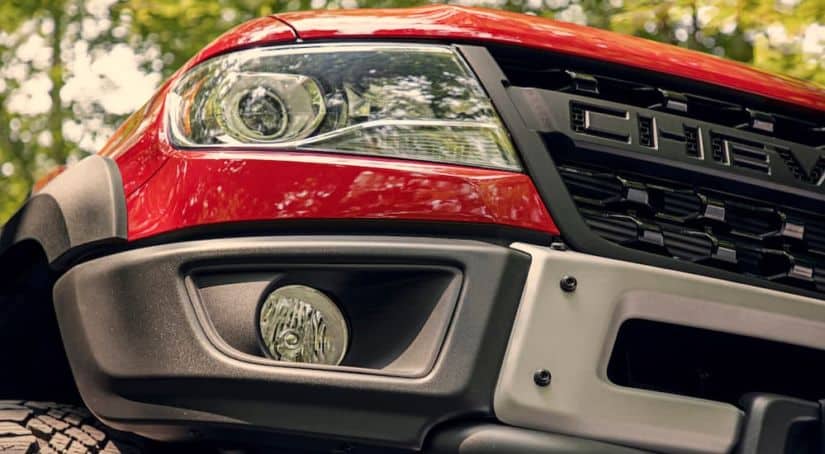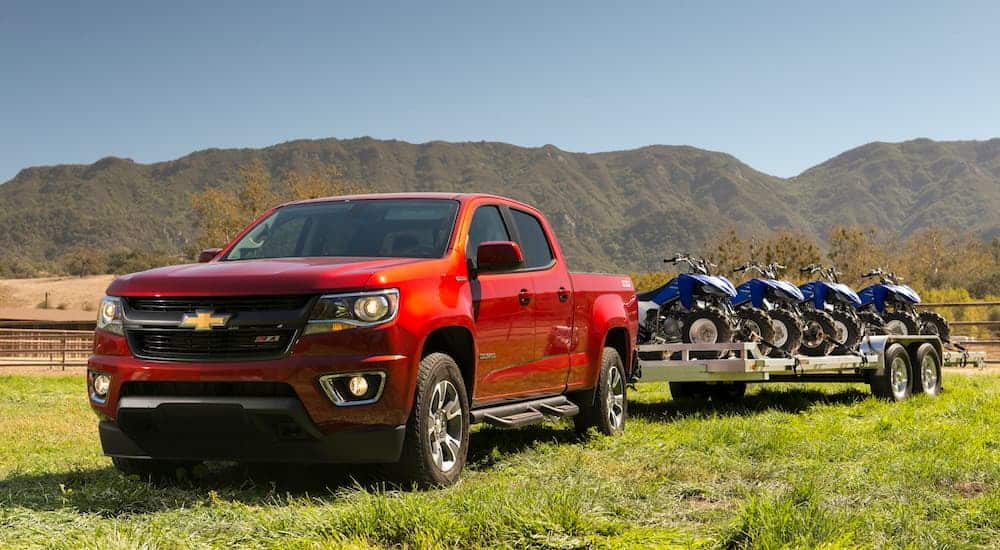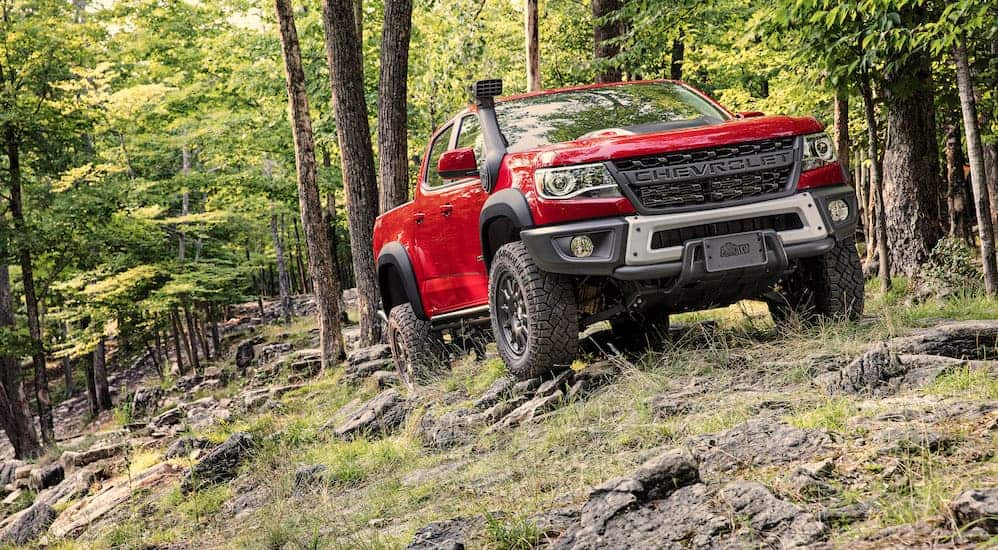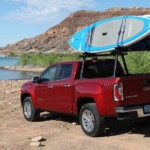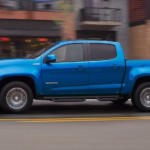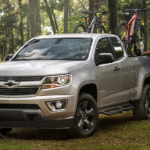The recent resurgence of interest in the midsize truck segment has inspired its fair share of conversations as of late. Just last year, dwindling representation across various lineups had led to the Colorado and Toyota Tacoma growing to command as much as 72% of the market share. And while it would be easy to read that as a lack of interest on the part of certain automakers, the new year brought us both the revived Ford Ranger and the upstart Jeep Gladiator. Recent months have even revealed RAM’s intention to explore a midsize offering of their own. So, with that in mind, let’s take a closer look at the 2019 Chevy Colorado and see if it’s truly deserving of such a large cut of the market when viewed on its own merits.
By the Numbers
With nearly twenty years under its belt, the Chevy Colorado has enjoyed an impressive spike in popularity since its mid-cycle refresh for 2015. At the start of its 2nd-generation, the Colorado only managed to move 32,634 units domestically. Coming out of the gate, 2010 numbers had nearly tripled and, three years later, 2018 sales nearly toppled the 169,000 marks. An impressive testimony as to the appeal of the Colorado, and it’s worth noting that 2019 sales here in the states are on track for similar results.
The 2019 Colorado
Priced to start around $32,795, the Colorado comes in both rear and four-wheel drive and can be configured in one of three ways. You can opt for the combination of an extended cab with a 74-inch long box, crew cab, with a 61.7-inch long box or crew bag and long box. In addition, there are four unique trim levels to choose from, as well as (trim allowing) three unique powertrains.
Choices kick off with the base (WT) Work Truck, powered by either a modest 2.5-liter four-cylinder or a 3.6-liter V6 mated to an eight-speed automatic transmission that channels 308 hp and 275 lb-ft of torque. That V6 powertrain is available across all four trim levels, but stepping up to the LT adds the additional option of the 2.8-liter Duramax Turbo-Diesel four-cylinder paired with a six-speed automatic transmission. With that change, the Colorado’s torque rating jumps up to 369 lb-ft while its horsepower comes in at a more modest 181 hp. These numbers carry over with both powertrains available in both the Z71 and trail-ready ZR2, the latter of which is priced to start at $43,995. Although each of those trims introduces distinctive characteristics all their own, which we’ll discuss further, and in greater detail.
For our money, the less said about the four-cylinder, the better. But a test drive with both the V6 and diesel Colorado, and you’ll find two very different experiences. For example, the V6 under the hood of a crew-cab build might offer a 6.1-second sprint to 60 mph, while the diesel will lag by almost three seconds. Of course, each combination of build and powertrain will introduce new variables – so it ultimately comes down to what you’re looking for in a truck. With the diesel, for example, one can expect all the benefits of a best-in-class towing capacity of 7700 lbs and a best-in-class fuel economy rating of 30 mpg highway. On the other hand, the V6 serves up its own best-in-class numbers with that 308 hp rating. No matter what, the Colorado shows up ready to perform.
And of course, several Special Editions are available to help accentuate the enticing appeal of the Colorado. The RST, for example, rides on 20-inch low-gloss, blacked-out wheels with matching badging. It also features Chevy’s “new face” grille, which features the Chevrolet name emblazoned across the grille crossbar. The aptly-named Trail Runner integrates ZR2 skid plates and rocker protection as well as DuraTrac tires to encourage a true off-road mindset.
The Redline Edition adds eye-catching red and black accents, while the Custom favors the consistency of a body-color aesthetic. And for those who prefer a darker, more mysterious look, well, what’s left to say about the Midnight and Dusk treatment that hasn’t been said before?
But even with all of these choices in terms of configuration, powertrain, trim levels, and special editions, there is one take on the 2019 Chevy Colorado that stands head and shoulders above its stablemates. And they could only call it by one name, Bison.
ZR2 Bison
Debuting an unprecedented partnership between Chevrolet and noted offroad up fitters American Expedition Vehicles (AEV). The ZR2 Bison asserts itself quickly as a depiction of the Colorado shot up with a back-alley dose of bovine growth hormones. If you’re expecting some sort of boost in output, you’re looking at the ZR2 in the wrong way. It arrives with the same confident powertrains but gains the equivalent of a suit of armor to protect it’s scaled up stature.
Two inches taller with an added 3.5-inches of width, the Bison boasts upgraded front and rear bumpers of stamped steel, as well as five distinct skid plates. Positioned to shield the trucks soil pan, fuel tank, locking front and rear differentials and transfer case, these plates are an inarguable trade-up from the aluminum panels present on the standard ZR2. Combined with such features as the uniquely styled 12-spoke wheels and upsized wheel-well flares, there is no mistaking the Bison for ‘just another Colorado.’ The various upgrades add over 200 lbs all on their own; and if you opt for the diesel, which we recommend for low-speed offroading, you’re looking at yet another 200-ish pounds. Not that the Bison is sluggish. But, if you’re steering clear of aggressive offroading, we’d suggest that you favor the V6 with its 7-second sprint to 60 mph and 15.5-second quarter mile.
At the end of the end, hi-po’d midsize truck offerings are still something of an oddity. Setting aside the introduction of the Gladiator, the Bison’s closest competitor is probably the Tacoma TRD Pro – an offering that could barely qualify to hold the Bison’s proverbial jock. But pricing matters, and with a starting price point of $43,995 MSRP for the V6, it’s hard to get excited. I mean, that’s just a few thousand dollars cheaper than the Raptor – why wouldn’t we just spend the extra for the better-all-around pickup? It’s also significantly more expensive than the Rubicon, which manages to tick most of the boxes when it comes to offroading. Ultimately, in our opinion, the Bison is a great vehicle – but is only the right choice if you’re a Chevy loyalist, or are really into the Colorado.
The Colorado
Simply put, the Colorado reigns as one of the few mainstays of the midsize segment. Ford and Jeep might have stepped to the plate, but we’re going to demand some more consistency before we list the Ranger and Gladiator as legitimate contenders. In all honesty, we’re genuinely interested in the idea of a midsize RAM. But, until then, we’ll just be content to watch the Colorado and Tacoma duke it out for supremacy.
Which do you prefer between the Colorado and Tacoma? What about the Ranger and Gladiator? How do you think they measure up against one another? Be sure to leave your comments below. We want to know
